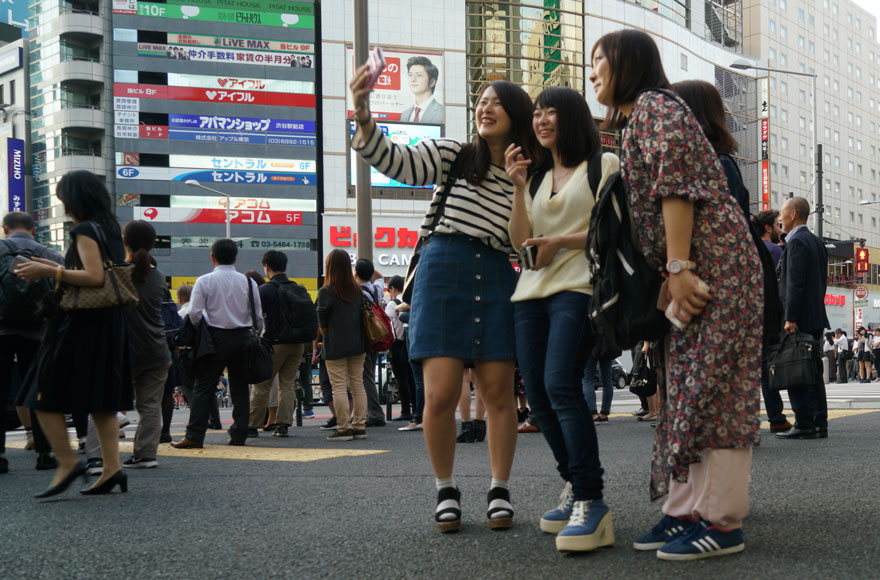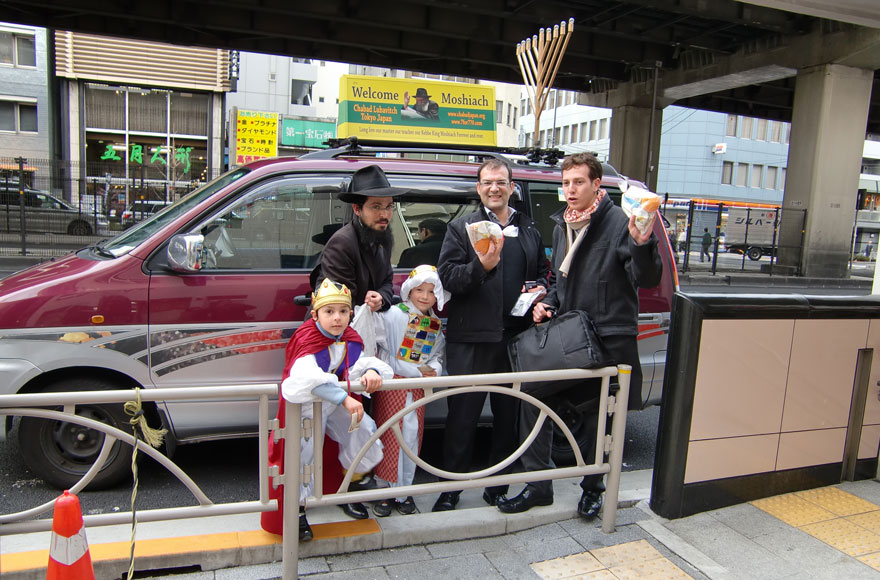For Israelis in Japan, the North Korea nuclear threat is business as usual
Published December 8, 2017

The scene outside Tokyo’s Shibuya Station is busy and lively, as seen here on Oct. 3, 2017. (Cnaan Liphshiz)
TOKYO (JTA) — Outside this city’s largest synagogue, a wailing siren drowns out the sounds of traffic.
The cacophony alarms a boisterous group of students headed to the nearby United Nations University. Fearing an earthquake, they instinctively run into the middle of the small street in the busy, upscale neighborhood of Shibuya.
But they relax and giggle nervously when they realize that the siren emanating from the Shiritsutokyojogakkan Elementary School, opposite the synagogue, has nothing to do with seismic activity. Rather it is part of a nationwide series of drills designed to ready the population of this island nation in the event of a missile attack by its bellicose nuclear neighbor, North Korea.
“We really are not prepared for this,” Riku Yushin, a post-doctorate student who was standing outside the Jewish Community of Japan Conservative synagogue, told JTA in October.
“Unlike you,” he said of Jews, “we’re not used to this sort of thing here in Japan. We worry only about earthquakes.”
Yushin may be partially right about the Jewish community’s relatively blase attitude. Japan’s Jews form an eclectic group of several hundred people, with sizable American and Israeli contingents. And perhaps not surprisingly, the many Israelis living here — raised in a climate of constant security threats — are pooh-poohing North Korea’s escalating military provocations. (The latest happened last week: For the second time this year, Pyongyang test launched a missile that landed inside Japan’s territorial waters.)
But it’s a different story for the American Jews living in Japan. They say they find the threat deeply disturbing, especially in a country that has served as a safe haven for Jews for the past 150 years.
Israelis may relativize the North Korea threat with memories of Iraqi Scud missiles raining down around their homes, but it’s “very hard” for Americans “when the Tokyo city government tells us that if there’s a nuclear attack, we’ll have about five minutes to go into the basement,” said David Kunin, the synagogue’s New York-born rabbi.
Israelis are accustomed to hearing Prime Minister Benjamin Netanyahu say Iran may bomb Israel with nuclear weapons, “even if that’s not immediately true,” he said, noting that Iran does not actually have nuclear weapons.
By contrast, the threat to Japan is concrete and potentially immediate. Plus, adding to the mood of anxiety is the recent decision by several local governments, including in the Tokyo area, to hold drills at schools. It may be necessary, Kunin said, but it’s especially stressful for parents and children.
In Israel, schoolchildren are regularly drilled in procedures in the event of an attack. They practice evacuating classrooms quickly and calmly into on-campus bomb shelters that are equipped to protect against chemical weapons attacks. These drills often have a lighthearted approach — many students relish the activity as a welcome break from the school routine.
But in Japan, such drills — combined with constant news about the North Korea threat — are making “people feel very worried” in a country without an army, said Hidetaka Muto, a Tokyo father of three who works as the right-hand man for Binyomin Edery, one of the city’s two Orthodox rabbis.

Rabbi Binyomin Edery, left, and some of his congregants in Tokyo in 2009. (Courtesy of Chabad Tokyo Japan)
Also, unlike Israel, Japan largely lacks the infrastructure to protect the population in the event of an attack. For example, at the Kamimatsuyama Elementary School in Sakura, a city located 75 miles north of Tokyo, a recent drill entailed faculty and pupils running across the yard to the sound of a siren and the words “Missile launched! Missile launched!” In the yard’s center, the students squatted low with arms covering their heads.
“We haven’t got a nuclear shelter or even strong buildings, so this is all we can do,” Nakamura Takashi, an official of Sakura City who helped to organize the missile defense drill, told Time magazine in September.
“The government says you have a much higher survival rate if you crouch rather than stand up,” he added.
Because of Japan’s history as the only nation that was attacked with nuclear weapons, the North Korea threat plays upon nightmares that remain very much alive in the national consciousness. Japan’s defeat in World War II, following the nuclear bombing by the United States of Hiroshima and Nagasaki, left its society with a nuclear trauma reinforced in movies, comic books and popular culture, Muto explained.
“So it’s particularly disturbing to come again under this threat for the first time in almost 80 years,” he said.
By contrast, the rabbi’s wife, Efrat Edery, who was born in Israel and, at 40, has nine children, isn’t particularly worried.
“What, the North Korea thing?” she said. “I see it on the news but, to tell you the truth, I’m not really concerned. I think it’s all talk and I don’t get the feeling that Japanese people around me are particularly worried about it, either.”
Lior Pasternak, an Israeli father of two from the western city of Izumiotsu, which is located just 500 miles from North Korea’s southern border, was equally dismissive.
“I’m pretty sure this posturing by North Korea will not lead to violence because even the loudmouth in Pyongyang doesn’t want to mess with Donald Trump,” he said in reference to dictator Kim Jong-un and America’s president.
“Besides,” added Pasternak, a former combatant in the Israeli armored corps, “for a Jew and an Israeli, it’s never a good idea to get frightened by threats, or we would have to leave or freak out pretty much everywhere we live.”
Yet Japan is precisely one of a handful of places where Jews had been able to live threat-free lives – including during the Holocaust. Jews came to this country for its safety and opportunities shortly after Japan ended its policy of isolation in the latter half of the 19th century, according to Shmuel Vishedsky, the rabbi of Kobe. His city near Izumiotsu, in Japan’s west, was one of the first places where Jews settled here.
Kobe, a bustling port city that is favored by many Western expats, is home to Japan’s oldest Jewish place of worship, which began in the early 1900s. The city’s synagogue, Ohel Shelomoh, was built in 1970 atop the storage basement where the first Jewish settlers from Eastern Europe used to pray. With its wooden decor that marries Jewish and Japanese symbols, it is also one of the country’s prettiest, attracting non-Jewish visitors from across Japan to the resident congregation of some 100 Jews.
The city’s earliest Jewish settlers came here to flee persecution in Eastern Europe and explore the potential of the newly opened market, Vishedsky said. And they remained protected throughout World War II, when their brethren were butchered in their home countries.
In fact, Japan is the only member of the pro-Nazi Axis powers whose Jewish population grew during the Holocaust. That’s largely thanks to Chiune Sugihara, a Japanese diplomat who in 1941 was serving in Lithuania. In defiance of his superiors’ orders, he issued visas to thousands of Jews who thus were able to flee the advancing Nazis and survive the war in Japan and its occupied areas in China.
Despite this new threat from North Korea, Jews can still feel safe in Japan, according to Moshe Gino, a member of the Kobe Jewish community who settled here in the 1990s and has two children with his Japanese wife, who converted to Judaism.
“That’s a constant,” he said.














